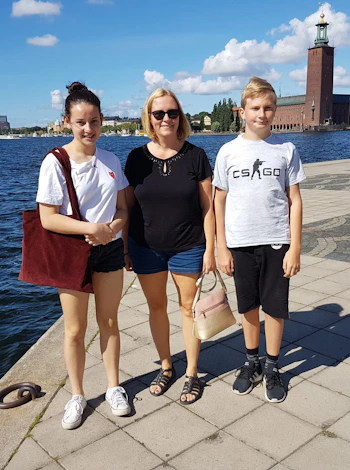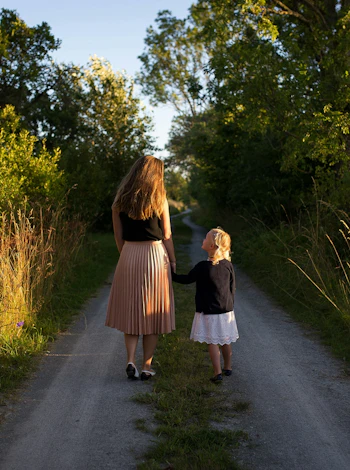High school exchange program
in Sweden
Immerse yourself in the life of a Swedish student, attending a local high school and living with a Swedish family for a semester or year exchange program.















Live like a local in the land of the elves
Student exchange program in Sweden
Sweden is one of the largest countries in Europe, but also one of the less densely populated. Its landscape is varied and ranges from long sandy beaches to enormous forests and sparkling lakes. A magical place, cloaked in fascinating folklore, mythology and traditions.
Living in Sweden means becoming part of a deeply engaged and open society, committed to sustainability and social issues. Contact with nature is also highly valued by locals.
Swedes may initially come across as reserved people, but it won’t take long to find out they are curious, welcoming and open-minded individuals who will make your student exchange program unforgettable.

The power of Swedish nature
Midsommar
One of the biggest celebrations in Sweden, on Midsommar people gather to welcome the arrival of summer. Celebrations involve outdoor parties, music, traditional dancing and food stalls with typical delicacies. An occasion not to be missed, if you want to experience Swedish culture in all its glory.
What’s high school like in Sweden?
A personalised education plan
Students can personalise their educational journey by choosing amongst a wide range of subjects and courses. The main goal is to nurture one’s interests and prepare for a rewarding career.
Learning self-accountability
Wellbeing and personal development come ahead of academic performance. At school in Sweden, you will learn that freedom leads to becoming more independent, mature and self-accountable.
Sustainable development
Sweden’s commitment to the environment is integrated in the curriculum: students learn about sustainability, become more aware of current issues and find out how to adopt an environmentally conscious lifestyle.
Lunch for everyone!
Swedish schools serve a nutritious meal for lunch – free of charge (well, tax-funded). The idea is to give all students equal conditions for learning, as no one should go hungry in school. Lunch is often served buffet-style, including hot food and vegetarian options.
A land of immense beauty. Let it surprise you with an exchange experience!
Choose authenticity – trust WEP and prepare to be amazed.
On a WEP Classic program, you will experience the most authentic side of Sweden. You may be placed anywhere in the country, depending on the location of the host family who has chosen you to share this incredible adventure with.
Volunteer host family
Public school
Placement anywhere in Sweden
Semester or year programs available
Your host family during your exchange year
Gain a second family – they can’t wait to welcome you into their lives!
Here is why:
At first sight, Swedes may come across as introverted, but as you get to know them you’ll find out they are warm and welcoming. Your Swedish family will make you feel at home.
Swedes are a sporty bunch, and they love to be outside both in summer and in winter! You’ll have plenty of opportunities to get out and about with your family, especially over the weekend.
Swedish family aren’t usually very large, but they place a lot of important on sharing – whether it’s chores, or time together. Long-lasting bonds will be formed as you share daily life with your host family.



Your school in Sweden
Find out more about your school experience in Sweden
Compulsory education in Sweden lasts 9 years and includes children aged 7 to 16 years old. Swedish children usually commence their journey at Förskola (preschool), which is optional and caters to children aged 1-6. All children begin primary school (Grundskola) by the age of 7, until they are 15 years old.
Most students then continue with secondary schooling (Gymnasieskola) until the age of 18.
The Swedish education system
In Sweden, compulsory subjects taught across primary and secondary school are Swedish, English, maths, science, social science and PE. Optional subjects include home economics, wood and metal work, design, music, art, geography and a second foreign language.
A third or fourth foreign language is usually added when students begin secondary school. As a rule of thumb, the more optional subjects students take on, the more positive their final evaluation will be.
Subjects in Sweden
Secondary school in Sweden lasts three years:
- Årskurs 1 (15-16 years old)
- Årskurs 2 (16-17 years old)
- Årskurs 3 (17-18 years old)
Secondary education can include a more academically focused/theoretical program, aimed at accessing university, or a more vocational/applied skills program, focused on entering the workforce.
The academic program is divided in different streams:
- sciences
- humanities and the arts
- languages
- business
- technology
- social and media
The vocational program includes courses in the following areas: healthcare, building and construction, thermal engineering, electronics and energetics, craftmanship, mechanics, hospitality and food technology, commerce and administration, logistics and transportation, youth services, human resources.
Sweden secondary school
On a typical school day, you will normally have no more than three classes, leaving plenty of time for extra-curricular activities. These include sports such as soccer or ice hockey, or creative activities such as art and crafts workshops or cooking classes.
High school students commonly attend after-school programs, to complete their assignments or receive additional tutoring. Older students also join local sport or music clubs, independently from the school.
Extra-curricular activities
The academic year is approximately 40 weeks long. The year is split into two terms: the Autumn term begins in the second half of August and goes until Christmas, including one week off in late October/early November and another 2.5 weeks off around Christmas. The Spring term starts in the second week of January and ends in June, including a break around February for sportlov or sports holiday (a popular time for families to enjoy winter sports and activities) and a break for Easter.
The academic year wraps up in June, leaving students with 10 whole weeks of summer holidays.
A typical school week in Sweden goes from Monday to Friday, starting around 8:00 am and ending at 1:30 pm for younger pupils, and 3:00-4:00 pm for older students. Each school decides their class times and schedule, as long as students complete the correct total of study time based on their age.
The school calendar
In the Swedish education system, students only receive grades from the age of 12, and only twice a year, at the end of each term.
Grades go from A to F, where the minimum passing grade is E. To access university, students must present the school report for their last Autumn term, which can be integrated with the report card from the Spring term if need be.
Grading system in Sweden
Stories from students and parents who have been there
Here are the testimonials of families who have chosen WEP for their exchange experience.
Join one of our upcoming events
to learn everything there is to know
about our high school exchange programs!
Going with WEP is best
Since 1988, a wide choice of destinations and comprehensive assistance before, during and after your overseas program. WEP is the ideal partner for your big overseas adventure.
Like you, we also get to choose who we travel with: our schools, host families and overseas partner organisations are carefully selected.
We offer a custom-made insurance policy, specifically designed for our participants, and we have a solid network behind us.
Emergency assistance, overseas and from Australia, is available 7 days out of 7, 24 hours a day, 365 days a year.
Allowing all our participants to live their desired overseas experience is a mission, a challenge we're thrilled to accept.
FAQ
Your host family, local coordinator and your host organisation will provide you with support while you are overseas. WEP Australia will remain in contact with the host organisation and your parents to coordinate and support your experience. In case of an emergency, both you and your family will be able to call an emergency phone number that is answered 24/7.
You will be advised of your placement location, host family and host school as soon as feasible. This can range from a few months prior to departure, right up until departure, as a lot needs to happen behind the scenes before each student's placement process is complete and can be communicated to you with certainty. The placement process doesn't only include sourcing a suitable host family, but also finding availability at a local school, and completing all red tape (including, for example, lenghty criminal history checks in some countries). Prior to departure from Australia, all students will receive host family, host school and local coordinator details.
Independent travel is not permissible while on exchange. However, you will be able to travel with your host family, school, host organisation and other community groups such as sporting teams or scouts. Again, the foremost aim of the program is educational, and your priority for any holiday periods must be your host family, who will be investing a lot of time, energy and money into this experience - simply in return for your frienship and positive contribution to their household.
Generally speaking, overseas schools won't issue a diploma to exchange students who are only there for a short time and don't graduate at that school. You may however be provided with a honorary certificate, as well as a WEP certificate of completion, which however don't count towards credit or graduation in Australia.
Language experience is desirable, but not necessary, for most countries. However, some countries have mandatory language requirements. You'll find the specific requirements for each country listed on its page. Intensive language courses may, in some circumstances, meet language pre-requisites. WEP strongly recommends language preparation prior to departure as language knowledge is of enormous benefit in assisting you to quickly adapt to your new family, school and life.
Of course, there are English-speaking destinations available if you are not interested in learning another language.
No, it's the host families who choose the student they wish to invite into their home. Based on the documents you will submit as part of your WEP application, one lucky family will choose to open their home and hearts to you, which is why for all Exchange Classic programs, and many Flex programs as well, there is no avenue for students to choose a specific location.
It may be possible to live with an overseas family that you already know (excluding relatives of the student). However, the family will have to be screened and approved, prepared and supported by our partner organisation in the same manner as any other host family. School enrolment must also be available.
More questions?


